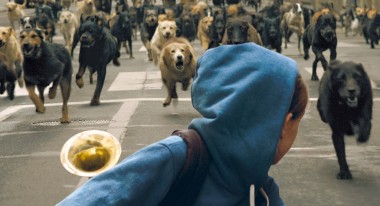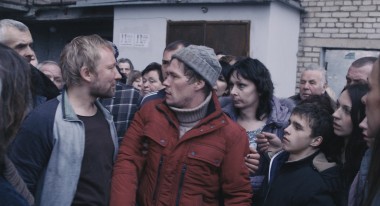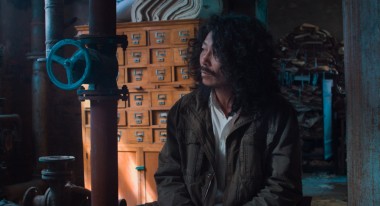 Back to selection
Back to selection
Dogged: An Initial Five Picks from New Directors/New Films
 Violet
Violet A hat tip to former telecritic Richard Roeper for his prescient 2003 book of silly lists called 10 Sure Signs a Movie Character is Doomed, and to the egghead resident who left a tattered copy on the giveaway table next to my building’s mailboxes. After many years and glib phrases covering New Directors/New Films — to my mind the most beguiling annual movie event in New York — I could not for the life of me figure out how to even begin another review.
Now in its 44th edition, ND/NF is a showcase for the work of emerging talent carefully curated by MoMA’s Jytte Jensen, Raj Roy and Josh Siegel, and partner organization Film Society of Lincoln Center’s Dennis Lim, Marian Masone, and Gavin Smith. These programming vets responsibly vet relative unknowns for institutional shout-outs — anyone heard of Belgian filmmaker Bas Devos, whose Violet is this edition’s to-date discovery? — and pass on others prepared to sell Granny out for the validation. Unlike the FSLC’s more predictable New York Film Festival, this lineup jolts with the pleasurable shock of the new.
Each director brings something different to the table. How dare I lump these acknowledged misfits into an enforced cohesive whole? Wait a sec. Doom! The title on the paperback’s cover mashed me — hard. It zapped my ebbing energy — and so did the dame with the nice gams standing next to it. Oops, sorry. The word stuck in my mind, encircling the names of, and stand-out imagery from, the numerous selections I’ve been watching — one….after……the……other. Does this one disappear? Does that woman’s career go south? Do these altruists lose their battle against exploitation? Many of the protagonists in these films, especially the five I gold-star below, face misfortune, permanent or temporary.
Doomed yet persistent; gloom is not necessarily in the equation. Hell, smoking opium may harm your health, but following the downward spiral can be an engrossing, thrilling journey. These are not typically happy-ending movies, or even plain happy ones driven more by box-office than fealty to truth or an artist’s vision. There is a there here, key to arriving at an important distinction of New Directors films: They flip the bird at Hollywood.

More unscientific observations: Some titles may be plot-centered, others more about mood, but almost all are character-driven. Frustration is a recurring topic that ties in with another: rebels with or without a cause. Both aesthetic and sociological absurdity hover over some of the finest films. On a more quantitative note, the selection is geographically dispersed, a healthy proportion of the 24-odd features coming from Asia and underserved Eastern Europe and South America (one-quarter from North America). Ditto for genre: Docs account for a respectable four; the insistently revisionist narrative films run the gamut.
In top-down preferential order, the following are to my mind the most accomplished titles from the first half of ND/NF. Picks from the remainder appear next week.
Violet (Bas Devos, Belgium/Netherlands)
The digressions in this otherwise fairly straightforward story — the aftershocks for a teen BMX freestyle cyclist who witnesses a close friend’s senseless murder — feel like fruitful collaborations between masters of painting, animation, and photography. They appear almost randomly following a frigid opening sequence in which we watch from a safe distance (on four CCTV monitors) the killing inside the worthless security room of a hollow mall. The lanky boy, Jesse (Cesar De Sutter), is 15, and, like many youths his age, not particularly articulate, unable to express his grief and pangs of guilt for inaction. When he and his biker buddies commiserate, the dialogue is shallow. Jesse’s father communicates with hugs and cups of coffee; his mother says nothing. He finds solace in voyeurism, a nocturnal spy outside the brightly lit household of his late pal. Words failing almost everyone, the visually arresting scenes, most from Jesse’s POV, are word surrogate projections of his most intimate thoughts. Over the course of the film, their self-conscious artifice neuters the harsh hyperrealism of the surveillance screens.
At times the non-narrative scenes are abstract, colorful blurs, like images you get from rubbing your eyes, or montages of held medium shots, or successive stills of banal people or objects signaling Jesse’s heightened stoner perception, or rapid, slightly out-of-focus views of the countryside. Is the trajectory of the movie Jesse’s return to some subjective normalcy? I don’t want to give anything away, but Devos and amazing DP Nicolas Karakatsanis, shooting on 65mm and the digital ALEXA, poke holes in such a simple scenario. Karakatsanis does an expert job not only with the fantasy scenes, but also with more naturalistic ones, such as stylized but “realistic” shots through door and window frames, and, most memorably, of all the chums bouncing way up and way down, no impetus in sight, glued to their beloved vehicles. Don’t think Paranoid Park: This is a different movie.
White God (Kornél Mundruczó, Hungary/Germany)

This is not Lassie Come Home. Hungarian filmmaker Mundruczó (Delta, Tender Son: The Frankenstein Project, Johanna) hardly qualifies as a new director, but he earns stripes for directing 280 dogs in this bold tale, drawing well-thought-out parallels between canine protagonist Hagen (Luke and Bodie) and his human master, 13-year-old Lili (Zsofia Psotta). Their tight bond is severed while they temporarily stay at the unwelcoming apartment of Lili’s bitter divorced father. The professor-turned-abattoir-inspector throws out the lovable dog on the side of a heavily trafficked road. Economics trumps family: The government demands a tax on mutts — but not Hungarian purebreds — and Dad refuses to comply. The metaphor is obvious in a country with a shameful track record on the treatment of minorities.
Separated, the two are transformed. Lili spends the time she’s not searching helplessly for Hagen playing trumpet in rehearsals for a school production of Wagner’s Tannhäuser. She becomes aware of boys, especially the cute older pianist who looks after her. The director adds another layer of storytelling to a set of genres as mixed as the animal’s breed: White God becomes a coming-of-age film as well. The trumpet itself is a loaded symbol binding her to the teen crush and her dog, and by extension, the film’s dogs, all 280 of them. Coexistence is the goal.
Poor Hagen. He involuntarily surveys the lower depths when not scrambling to avoid ubiquitous dogcatchers who gather only mongrels. A petty crook sells him to a dogfight gambler, who trains him to be just the opposite of the cuddly house pet that slept in Lili’s bed — although the metamorphosis of living beings of any species rarely hits 100%. The atrocious experiences make him as heedless of authority as Lili, who fearlessly defies parents, music conductor, and animal shelter director. Hagen opens the gate of the pound where they are preparing to put him down. All the dogs escape, Hagen in the lead. He, more than the others, is out for revenge: not the animal blood the evil trainer forced him to crave in a Pavlovian aberration, but the human variety flowing through the veins of those who done him wrong. Their different paths have to cross.
DP Marcell Rev does a superb job of filming around the unwatchable, as well as directly on the enormous pack of racing animals that overwhelm Budapest without the benefit of CGI. Hagen, too, comes of age, rising from subservient pet to leader of a just mass revolt. The dramatic question is whether or not Lili can accept this new incarnation. Special kudos go to real-life trainers Teresa Miller, who worked in the U.S. with the alternating lead brothers, and Arpad Halasz, who managed the others on home turf. All 278, Arpad?
The Fool (Yuriy Bykov, Russia)

To be called a fool — durka — in a society where domestic violence and general corruption go hand in hand should be a compliment. The obese, kvetchy mother of plumber/student Dima Nikitin (Artem Bystrov, perfectly cast) applies it acidly to both her husband and son. After all, her spouse won’t accept bribes like everyone else. Dima prefers to complete his engineering studies rather than use the tuition money to buy a garage so that his pensioner parents can live more comfortably in the new Russia (Mom was a doctor in the old one).
Before the end of this fine-tuned, fast-paced film by Yury Bykov (The Major), Dima is called much worse by his civil service colleagues who work (or pretend to while accepting buyoffs) for a provincial municipality. After the stressful dinner at the apartment Dima, his wife, and young son share with his folks, he is called to fill in for his inebriated boss. He joins the crew at a nine-story housing project that more than 800 lowlifes and others on the margins call home. Pipes have broken in the cursed unit of a sleazy alcoholic who beats wife and daughter for drink money in sight of the helpless repair team.
Unlike everyone else in the film, diligent young Dima goes the extra mile, surveying the building to find the cause of the bizarre rupture. He discovers a huge vertical crack running from foundation to roof and a 10 degree tilt of the entire structure. He understands that an evacuation is mandatory — in midwinter, no less — but who is he in the warped bureaucracy to order it? Racing against time, he crashes the drunken 50th birthday party of the forceful mayor, Nina (a fabulous Nataliya Surkova), where he finds everyone who would have to be in on a need-to-know action.
While they await her final decision in a restaurant chic only by Eastern European standards, some label him a fool, while his immediate supervisor, who had pocketed the money set aside for the edifice’s full renovation, adds “shit-stirrer” to the mix. We have here two dramas: a small one in which a frustrated wife (women don’t come off too well here) fights with her uncompromising husband, the other one that, on a larger canvas, is a synecdoche for the way things don’t operate in Russia. Do any of the civil servants have clean enough hands to pursue a solution that would save 800 little people? Let them eat babka.
K (Darhad Erdenibulag & Emyr ap Richard, China)

Before land surveyor K (shaggy-haired, grungy non-pro Bayin) even enters the labyrinthine buildings that will envelop him during his futile attempts to reach an enigmatic spot called The Castle, we know from the first shots — exteriors depicting his isolation in vast steppes — that the film not only disrupts the contiguity of cinematic space, but also ignores classical continuity. There’s an unconventional cut between a medium shot in front of a standing K and an extremely long shot from a 90 degree angle in which he walks toward the camera. And another cut, between a shot from a different angle and a medium shot of his head on the table of a hotel restaurant in The Castle’s sister village. There is no establishing shot to introduce either venue or his location inside.
The protagonist of Kafka’s unfinished novel The Castle, K is the archetypal outsider, unnoticed by the authorities and disliked by the locals. Co-directors Erdenibulag, from Inner Mongolia, and Welsh native ap Richard transpose the book’s wintery Middle European setting to the sizzling plains of Inner Mongolia. K encounters a succession of male secretaries to the top dogs always a few meters or minutes away. His goal is to connect with chief honcho Klamm, the most elusive of all (one woman calls him “only a rumor”), in order to sort out problems with the invitation he received to work there. Frustrated, he becomes increasingly blasé, then gets sucked into this strange realm. He makes appointments that will not be kept. He speaks to the other characters as if this were a normal, effectively run enterprise — even after he is demoted from a nonexistent job to janitor in the local school.
Early on, this womanizing borderline narcoleptic begins a fling with barmaid Frieda (Jula). We are supplied no motivation. This is an acausal world of contained chaos. Things just happen. A character in one place abruptly arrives in another. The spectator is forced to trust ellipses from start to finish. Villagers are frequently interchangeable, minor technocrats appear out of nowhere, and a lengthy, digressive story-within-the-story reinforces the non-linearity of the narrative. Structure and action defy logic. Characters retain the book’s German names. K proves to be an unreliable narrator. We are not only distanced, we are left out of the loop altogether.
The filmmakers execute an extraordinary minimalist, gritty interpretation of the subject of Kafka’s final work: Man’s alienation and dehumanization in the face of incomprehensible, dysfunctional bureaucracy. Spatially, this translates into deformation and fragmentation, as well as dark, claustrophobic interiors (the duo insists on natural lighting). The word trippy comes to mind; so does the kinder, gentler Wonderland. Lyrics from Jefferson Airplane’s “White Rabbit” are the appropriate finale to this discussion of K:
When logic and proportion
Have fallen sloppy dead
And the white knight is talking backwards
And the Red Queen’s lost her head
The Kindergarten Teacher (Nadav Lapid, Israel/France)

Hagar is beautiful enough
Enough for me
Enough for me
Gold rain falls over her house
It is truly the sun of god
Married to a mediocre devotee of unfunny live TV comedies and mother of two, fortyish title character Nira (Sarit Larry, a striking middle-aged find with intense blue eyes) reads this poem to the evening poetry class she takes to nourish some newly realized creative instinct.
Everything is wrong with this picture. She is not a poet; in fact, whenever she tries to write, she stares at a blank screen. Her professor assumes it is an ode to a lesbian lover. Wrong, he finds out after screwing her — and she only makes love to him to advance an agenda. She did not write the poem. Like his nanny, who uses it for acting auditions, she appropriates the words of a slightly odd, unassuming five-year-old boy, Yoav (Avi Schneidman), who attends the kindergarten class she’s taught for 15 years. He spontaneously walks to and fro for a while, halts, announces, “I have a poem,” then proceeds to verbalize it.
The one truth is that Nira desires, and needs to nurture, something creative. Yoav serves her purpose. She tries to get inside his head, but he can’t or won’t allow her in. Her questions echo the ones asked in poetry class by fellow students she mocks with a subtle frown. How does a child his age explain motivation? For that matter, how can a child that age, no matter how precocious, write elegant poems? We’ll accept that as a freak accident of nature, plus he has been tremendously influenced by his vulgar divorced father’s poet brother, a man of little means for whom the wealthy “high-end” restaurateur dad has nothing but contempt. As a result, the father is an obstacle to Nira’s rapidly expanding mission. She tricks the professor into enabling the angelic, round-cheeked boy to recite publicly. Ultimately, she wants to save him from banality of the type she lives with every day. Yoav is the last chance for this quietly dutiful wife, mother, and teacher to estrange herself from the ordinary.
Lapid (Policeman) has a keen eye, and this second collaboration with cinematographer Shai Goldman is visually complicated, the camera waltzing smoothly back and forth and around the kindergarten class with barely an interruption. You expect such coordination on the stage, but it’s rare in a movie, especially one full of pre-K children. Goldman knows how to film the more intimate scenes, too.
An off-putting physicality develops in the relationship between teacher and student — and I’m not referring to Nira and the professor — that threatens the empathy you might feel for her. She can barely resist touching the boy. She gives him an unnecessary shower in a locked bathroom. She showers herself when he is in the room. Bodies and body parts have special significance for Lapid. After all, the initial shot is a close-up of the bare foot of her slug of a husband. But does her obsession get too far out of hand? Answer: I am reviewing only the first 100 minutes of a 120-minute film.
